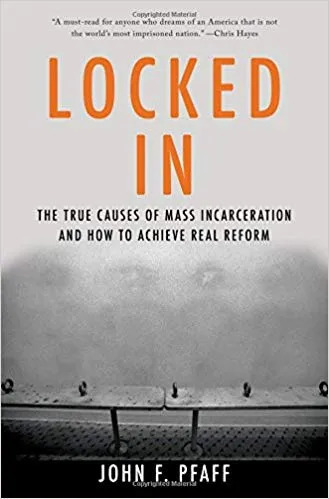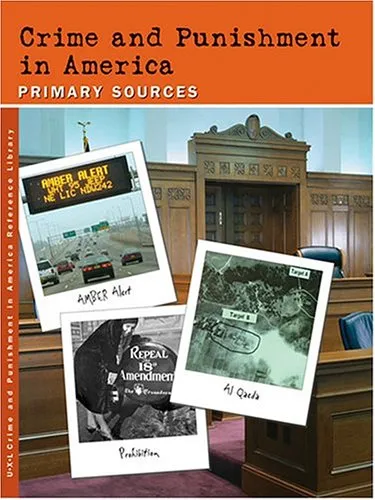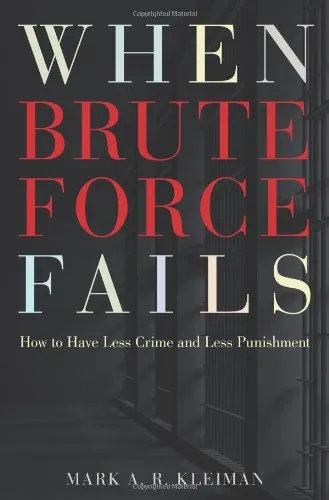Locked In: The True Causes of Mass Incarceration—and How to Achieve Real Reform
4.3
Reviews from our users

You Can Ask your questions from this book's AI after Login
Each download or ask from book AI costs 2 points. To earn more free points, please visit the Points Guide Page and complete some valuable actions.Related Refrences:
Introduction to 'Locked In: The True Causes of Mass Incarceration—and How to Achieve Real Reform'
In 'Locked In: The True Causes of Mass Incarceration—and How to Achieve Real Reform', author John Pfaff offers a groundbreaking analysis of the mass incarceration crisis in the United States. With a focus on data-driven insights, Pfaff challenges many of the commonly held beliefs about why the incarceration rate is so high and proposes realistic paths toward genuine reform. Emphasizing the power dynamics and systemic factors at play, this book is a crucial read for anyone invested in understanding and addressing one of America's most pressing social justice issues.
Detailed Summary of the Book
John Pfaff begins with the premise that many of the popular explanations for mass incarceration are not supported by evidence. Most narratives overemphasize the role of the federal government, focusing on high-profile topics like mandatory minimum sentences or the war on drugs. Instead, Pfaff argues, local prosecutors wield immense influence over the rising incarceration numbers, driven by unchecked discretion in charging decisions. The book meticulously deconstructs the myth that private prisons are a major driver of the prison population, highlighting that they hold only a small fraction of inmates.
Drawing on meticulous research and data analysis, Pfaff illustrates how the escalation of plea bargains and longer sentences have silently but drastically increased the American prison population. He points out that the majority of prisoners are incarcerated for violent crimes, which complicates reform efforts often modeled on reducing punishments for low-level, non-violent offenses.
In the concluding sections, Pfaff outlines strategic reforms that should focus on reining in prosecutorial power, increasing transparency in the justice process, and investing in evidence-based rehabilitation programs over punitive approaches. This book is a call to reinvent how we perceive, discuss, and tackle the challenge of mass incarceration.
Key Takeaways
- The role of local prosecutors is central in driving mass incarceration, with their broad discretion in charging decisions impacting incarceration rates more than commonly discussed federal policies.
- Plea bargains have significantly increased in frequency and impact, often pressuring defendants to plead guilty to lesser charges rather than risk harsher sentences at trial.
- The focus on violent crimes, rather than low-level offenses, is necessary to make any substantial impact on reducing the prison population.
- Real reform requires a shift in policy discussions toward structural changes and reducing the extensive power held by individual prosecutors.
Famous Quotes from the Book
Here are some poignant quotes from 'Locked In' that encapsulate its insights and urgency:
"As long as violent crime is treated as a third rail reformers dare not touch, real, substantial change will remain elusive."
"The heart of the system beats within the courthouses, not the prisons themselves, and changing outcomes must start there."
Why This Book Matters
'Locked In' is an essential text for policymakers, activists, and scholars seeking a deeper understanding of the roots and solutions to mass incarceration that transcends the surface-level issues frequently debated in public forums. By challenging conventional wisdom, Pfaff opens up new avenues for discussion and action that are data-driven and empirically grounded. The book not only critiques existing narratives but also pushes for conversations that address the often-ignored complexities of the criminal justice system.
As the United States continues to grapple with its carceral legacy, 'Locked In' provides both a crucial critique of past missteps and a hopeful roadmap for future reform – a reminder that understanding the true causes is the first step toward meaningful change.
Free Direct Download
You Can Download this book after Login
Accessing books through legal platforms and public libraries not only supports the rights of authors and publishers but also contributes to the sustainability of reading culture. Before downloading, please take a moment to consider these options.
Find this book on other platforms:
WorldCat helps you find books in libraries worldwide.
See ratings, reviews, and discussions on Goodreads.
Find and buy rare or used books on AbeBooks.
1406
بازدید4.3
امتیاز0
نظر98%
رضایتReviews:
4.3
Based on 0 users review
Questions & Answers
Ask questions about this book or help others by answering
No questions yet. Be the first to ask!







